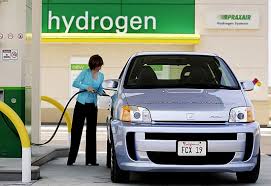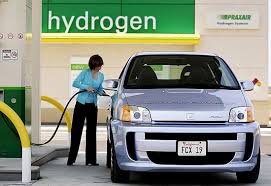
British roads would now have the first f the mass produced hydrogen cars. These cars have been billed for more than a decade as a clean alternative to petrol and diesel vehicles but only glimpsed as concepts at automotive trade shows up till now.
In the wake of the Volkswagen pollution scandal and revelations about the gap between lab and real-world emissions tests, hydrogen - the most abundant element in the universe, has added allure for carmakers.
South Korean manufacturer Hyundai is leading the charge. The company has made a crossover car worth £ 53,000. It is a squashed SUV that looks like a normal car. A futuristically styled saloon car priced at £ 66,000 is to hit the market manufactured by the world’s biggest carmaker, Toyota. Honda has promised to launch its model in the UK during 2017.
“The only emissions out of the back of the car is water, either as water vapor or droplets, so you have no CO2, no NOx, no particulates,” said Robin Hayles, manager of sustainable fuel development at Hyundai.
“You have the advantages of petrol and diesel in terms of range, performance and refill times, and the advantages of an electric vehicle: zero emissions, very smooth to drive, and instant torque,” he added.
The UK breaching EU pollution safety limits since 2010 has resulted from the NOx pollution emitted by diesel engines – which VW’s 11m affected cars underplayed. This aspect is to be held as the culprit behind the doubling of the UK’s current 30,000 annual premature deaths from pollution in a report to be out next month.
Companies involved in the infrastructure to power them and businesses such as taxi firms looking to advertise their green credentials at are the one who are buying or leasing the hydrogen cars to tackle that pollution. Hydrogen cars have been bought by organisations such as Transport for London, which powers one of its routes with eight hydrogen buses.
Not a single car however has been sold by Hyundai or Toyota to an individual consumer. These first hydrogen cars cost around twice as much as most of the electric cars they are competing against as a clean alternative to diesel and petrol and this can be explained as the reason that the hydrogen powered cars have not been bought by private individuals even after the EU-funded £15,000 grant.
This year, nearly 7,000 “pure electric” cars have been registered in the UK this year that includes the £21,000 Nissan Leaf and £ 31,000 BMW i3. While the new hydrogen models cost a similar amount to refuel as conventional cars, the electric powered cars cost about a quarter of the cost of petrol and diesels per mile travelled.
The cars’ range and quick refuelling as two reasons they will win out against their battery-based rivals argue the proponents of the hydrogen cars. Most electric cars have a range of around 100 miles but for exceptions like Telsa’s electric sports car which can run for nearly 300 miles between charges. O the other hand, Hyundai’s hydrogen car runs more than 360 miles for petrol-like distance.
“Mainstream electrical vehicles isn’t quite there yet,” said Neil Spires, product manager for Mirai at Toyota. The company believes that the future belongs to hydrogen cars even though electric cars are fitter for inner city use.
One of the hindrances for the popularity of hydrogen cars is the lack of hydrogen refueling points with just four public refueling stations in the UK, in locations including Hendon, Heathrow, Swindon, that rely on hydrogen deliveries by tankers. The industry says the total number of stations will rise to around nine or 10 by the end of 2016.
(Source:www.theguardian.com)
In the wake of the Volkswagen pollution scandal and revelations about the gap between lab and real-world emissions tests, hydrogen - the most abundant element in the universe, has added allure for carmakers.
South Korean manufacturer Hyundai is leading the charge. The company has made a crossover car worth £ 53,000. It is a squashed SUV that looks like a normal car. A futuristically styled saloon car priced at £ 66,000 is to hit the market manufactured by the world’s biggest carmaker, Toyota. Honda has promised to launch its model in the UK during 2017.
“The only emissions out of the back of the car is water, either as water vapor or droplets, so you have no CO2, no NOx, no particulates,” said Robin Hayles, manager of sustainable fuel development at Hyundai.
“You have the advantages of petrol and diesel in terms of range, performance and refill times, and the advantages of an electric vehicle: zero emissions, very smooth to drive, and instant torque,” he added.
The UK breaching EU pollution safety limits since 2010 has resulted from the NOx pollution emitted by diesel engines – which VW’s 11m affected cars underplayed. This aspect is to be held as the culprit behind the doubling of the UK’s current 30,000 annual premature deaths from pollution in a report to be out next month.
Companies involved in the infrastructure to power them and businesses such as taxi firms looking to advertise their green credentials at are the one who are buying or leasing the hydrogen cars to tackle that pollution. Hydrogen cars have been bought by organisations such as Transport for London, which powers one of its routes with eight hydrogen buses.
Not a single car however has been sold by Hyundai or Toyota to an individual consumer. These first hydrogen cars cost around twice as much as most of the electric cars they are competing against as a clean alternative to diesel and petrol and this can be explained as the reason that the hydrogen powered cars have not been bought by private individuals even after the EU-funded £15,000 grant.
This year, nearly 7,000 “pure electric” cars have been registered in the UK this year that includes the £21,000 Nissan Leaf and £ 31,000 BMW i3. While the new hydrogen models cost a similar amount to refuel as conventional cars, the electric powered cars cost about a quarter of the cost of petrol and diesels per mile travelled.
The cars’ range and quick refuelling as two reasons they will win out against their battery-based rivals argue the proponents of the hydrogen cars. Most electric cars have a range of around 100 miles but for exceptions like Telsa’s electric sports car which can run for nearly 300 miles between charges. O the other hand, Hyundai’s hydrogen car runs more than 360 miles for petrol-like distance.
“Mainstream electrical vehicles isn’t quite there yet,” said Neil Spires, product manager for Mirai at Toyota. The company believes that the future belongs to hydrogen cars even though electric cars are fitter for inner city use.
One of the hindrances for the popularity of hydrogen cars is the lack of hydrogen refueling points with just four public refueling stations in the UK, in locations including Hendon, Heathrow, Swindon, that rely on hydrogen deliveries by tankers. The industry says the total number of stations will rise to around nine or 10 by the end of 2016.
(Source:www.theguardian.com)





